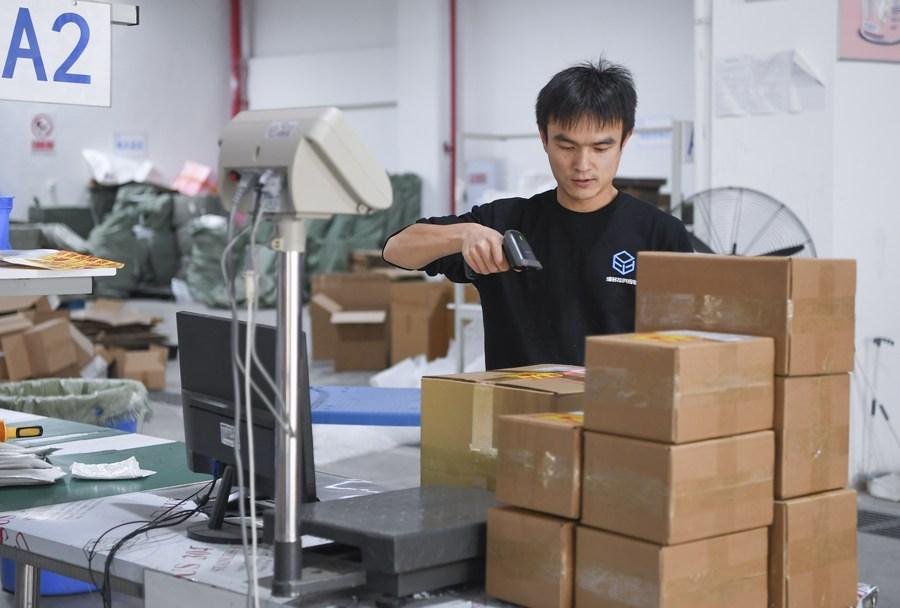
An employee works at a cross-border e-commerce company in Chongqing Fuling Comprehensive Bonded Zone, southwest China's Chongqing Municipality, Dec. 4, 2023. (Xinhua/Wang Quanchao)
BEIJING, Jan. 24 (Xinhua) -- Artificial Intelligence (AI) once again became a focus at the recently concluded 2024 World Economic Forum (WEF) Annual Meeting in Davos, Switzerland.
China has promoted the development of AI in application scenarios and formed industrial clusters, which attracted many foreign enterprises to invest. In Chinese market, e-commerce giant eye more industrial opportunities with the help of AI model and digital humans.
-- Enterprises increasingly bet on AI in e-commerce
In December last year, Alibaba Group began its layout for AI in e-commerce. "The era of AI e-commerce has just begun, and it's an opportunity as well as a challenge for everyone," said Jack Ma. Subsequently, Alibaba's newly appointed CEO Eddie Wu announced a strategic focus of AI-driven development. At the beginning of 2024, Alibaba's Taobao and Tmall Group completed the formation of its own AI team.
Online social media and e-commerce platforms such as Douyin, Xiaohongshu, and Kuaishou have also launched their respective AI products, such as AI management tools to help merchants generate live streaming backgrounds, live streaming scripts, short videos as well as digital humans.
In fact, AI-assisted e-commerce has provided vast opportunities for e-commerce giants such as Alibaba, JD.com and Pingduoduo to match multi-layered supply with diverse consumer demands.
Pan Helin, researcher of ZIBS Research Center for Digital Economics and Financial Innovation told the Securities Daily that e-commerce is gradually becoming homogenized and sees fierce competition on price. AI can help merchants avoid homogenized competition by precisely understanding consumers' demands to produce and stock goods as needed. For consumers, AI can help them obtain products that meet their individual needs.
The gross merchandise volume (GMV) of Baidu's e-commerce platform Youxuan increased by 594 percent year on year in 2023, with the number of transaction users and active merchants growing by 4 times and 3 times respectively. Of these, trades facilitated by AI big models accounted for 20 percent of the total transactions.
In November 2023, the number of overseas inquiries for products optimized by AI on Alibaba's international platform increased by 15 percent. In the same year, transactions supported by AI on Lenovo's official website exceeded 1.6 billion yuan.
Zhang Yi, CEO and Chief Analyst at iMedia Consulting, told the Securities Daily that the e-commerce industry has innovated from the early days of Taobao, JD.com, and then to social media e-commerce, and finally to e-commerce represented by short-video live streaming. With the continuous advancement of technology and business, the current AI e-commerce has the potential to become the next generation of e-commerce.
"Furthermore, AI will help cross-border e-commerce merchants and consumers provide more convenient conditions and solutions in different cultures," Zhang Yi said.
-- Digital humans become a new focus in e-commerce
Overall, digital humans have become a key direction for giants in their AI e-commerce strategies.
On January 10, Baidu announced a new round of AI e-commerce plans, with a continued investment in e-commerce for 2024. The AI digital humans, initially offered free of charge to attract merchants, are valued at approximately 1 billion yuan.
Recently, Lenovo's official website teamed up with JD.com's Yanxi big model to launch a digital human anchor, creating a live streaming room. JD.com also announced that by utilizing the big models, more than 70 digital humans have been developed.
According to the "2023 China AI Digital Human Industry Research Report" released by iMedia Consulting, it is predicted that by 2025, the core market size of China's virtual beings will reach 48.06 billion yuan.
With the push from traditional industries' digital transformation and the need to reduce costs and increase efficiency, the business demand for China's AI digital humans is further released. In the future, AI digital humans will become more emotional and humanized, providing services that are closer to the needs of enterprises and individuals, said iMedia Consulting.
Currently, AI digital humans play the role of hosts in the live streaming room of e-commerce, complementing real-life hosts, extending live streaming duration, and thus providing greater network flow. Digital humans can also improve the efficiency of office work such as quickly listing products and recording data, said Zhang Yi.
Data from Baidu shows that Baidu's digital humans can reduce nearly 80 percent of the live streaming operation costs for merchants. JD's Yunyanxi digital humans can intelligently process product details, quickly "remember" product selling points, and automatically generate scripts, allowing them to start streaming in just 2 hours at a daily cost of less than 100 yuan.
Pan Helin stated that the future direction of AI e-commerce development will be multi-modal large-scale models. Enterprises should put data and algorithmic thinking into every aspect of e-commerce to use AI to improve logistics and the entire process of supply chain manufacturing.
(Edited by Tian Shenyoujia with Xinhua Silk Road, tianshenyoga0524@163.com)




 A single purchase
A single purchase









